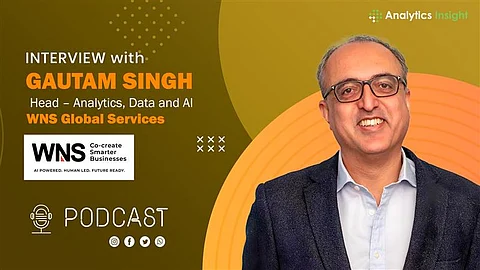The introduction of agentic AI is reshaping how businesses operate, moving beyond traditional automation to enhance decision-making and performance. In a recent episode of the Analytics Insight podcast, host Priya Dialani spoke with Gautam Singh, Head of Analytics, Data, and AI at WNS Global Services, about the transformative potential of this technology across various industries.
Agentic AI represents a significant evolution in business processes, allowing systems not only to automate tasks but also to adapt to changes and proactively resolve issues. Singh articulated that this advancement shifts organizations from a focus on capital-intensive digital transformation to an approach centered on achieving specific outcomes. “Agentic AI is not just about automation—it’s about systems taking initiative, making goal-based decisions, and helping humans make smarter choices,” he explained.
From Traditional Automation to Agentic Systems
While traditional automation has its place, it often remains confined to repetitive tasks. In contrast, agentic AI functions effectively within complex environments, integrating advanced analytics and AI deeply into business operations. Singh noted that WNS’s services are now productized, featuring reimagined processes powered by AI and analytics, which are executed on scalable platforms designed to optimize user experience.
This transformation represents a departure from outdated outsourcing models that primarily focused on labor cost savings. Singh emphasized that the current model achieves unprecedented efficiency, intelligence, and ongoing optimization.
Agentic AI has broad applicability, particularly in sectors such as:
– **Insurance**: Streamlining complex claims processing and risk assessment.
– **Legal and Investment Research**: Enhancing the speed of research-driven decision-making.
– **Life Sciences & Healthcare**: Facilitating advancements in drug development, diagnostics, and hospital operations.
– **Recruitment & Executive Search**: Improving candidate matching and evaluation processes.
Singh highlighted that while industry type plays a role in the success of agentic AI, the mindset and willingness of senior leadership to embrace this technology are crucial determinants.
Strategic Integration for Future Success
WNS focuses on embedding data, analytics, and AI into business processes, ensuring that these automated and optimized systems are outcome-driven for clients globally. Singh believes that adopting this approach provides companies with a competitive edge and establishes a foundation for the next generation of intelligent operations.
As he articulated, “In 2025, agentic AI isn’t just a tool—it’s the engine driving smarter, adaptive, and collaborative business processes.” This perspective underscores the critical role of agentic AI in not only enhancing operational efficiency but also in fostering a more innovative and responsive business environment.
In conclusion, the insights shared by Gautam Singh during the podcast reflect a significant shift in how businesses can leverage technology to optimize their operations and decision-making processes. The ongoing evolution of agentic AI is set to redefine industry standards, paving the way for enhanced collaboration between human agents and intelligent systems.






































































